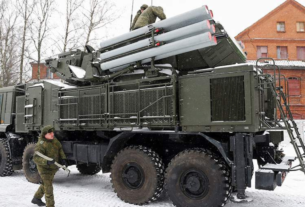On March 5, 2025, Israeli forces killed a Hamas commander during an operation in the West Bank. The commander was allegedly involved in planning attacks against Israeli civilians and military targets.
“The commander was directly responsible for recent deadly attacks on Israelis,” said an Israeli Defense Forces (IDF) spokesperson. The IDF claims that this operation was necessary to protect Israeli citizens and prevent further violence.
The raid occurred in a town near Hebron early in the morning. It involved airstrikes and ground troops, resulting in the commander’s death, along with several other members of Hamas.
“This targeted operation was aimed at dismantling terrorist networks operating in the West Bank,” said a senior IDF official. The operation also resulted in the destruction of Hamas infrastructure, including weapon caches.
Hamas quickly condemned the operation, calling it an assassination. A spokesperson for the group declared, “Israel will pay the price for this killing,” signaling further escalation in the ongoing conflict.
This operation is part of Israel’s broader strategy to combat Hamas in the West Bank. Israel regularly targets Hamas leaders and operatives, believing that such actions are necessary to maintain security.
Over the past year, violence in the West Bank has escalated, with clashes between Israeli forces and Palestinian militants becoming more frequent. Both sides have suffered casualties as the situation remains highly volatile.
The Palestinian Authority condemned the IDF’s actions, calling them unjust and illegal. “These operations only fuel violence and hinder any chance of peace,” said a Palestinian representative.
Israel justifies its actions as a response to ongoing threats posed by Hamas. Officials claim that dismantling Hamas’s infrastructure is vital to preventing future attacks on Israeli citizens.
Despite the ongoing violence, the Palestinian leadership continues to call for international intervention. They urge the United Nations to take action against Israeli military operations in the West Bank.
In the last several months, Israel has faced increased attacks from Hamas militants in the West Bank. Many of these attacks targeted Israeli civilians, which prompted Israel to step up its military response.
Palestinian leaders argue that Israel’s military operations are part of a broader strategy to maintain control over the West Bank. They contend that these actions only deepen resentment and make a two-state solution less likely.
“We will continue to fight against Israeli occupation until Palestine is free,” said a representative of Hamas. The group insists that its armed resistance is necessary to achieve its goal of an independent Palestinian state.
Israeli officials argue that their operations are necessary for self-defense and preventing further terrorist attacks. They maintain that they are committed to Israel’s security and will continue to act accordingly.
International human rights organizations have condemned the violence, calling for both sides to de-escalate. However, neither Israel nor Hamas has indicated a willingness to reduce tensions or negotiate a peace agreement.
The Israeli-Palestinian conflict has remained unresolved for decades, with both sides entrenched in their positions. Many fear that the recent killing of the Hamas commander will further derail peace efforts.
The international community is watching closely, hoping for a diplomatic solution to the conflict. However, with rising tensions, it seems unlikely that the situation will de-escalate soon.
Israel’s military operations in the West Bank have become a regular feature of the conflict. Both Israel and Hamas appear committed to their respective goals, leaving little room for compromise.




